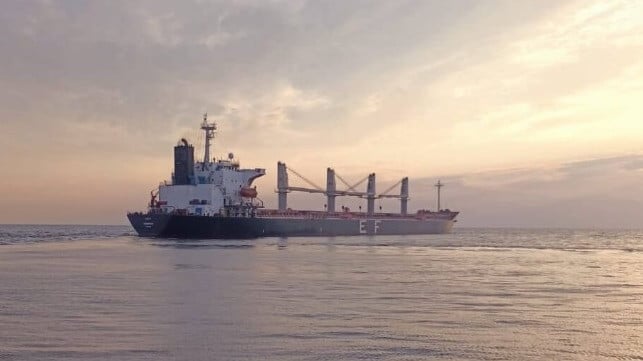EU Plans Black Sea Maritime Safety Hub Seeking to Build Regional Relations

The European Union is calling for the establishment of a new Black Sea Maritime Security Hub to coordinate maritime safety and support the economic development and stability of the region. It is part of a larger strategy released today that seeks to build expanded ties between the European community with the South Caucasus and Central Asia that would counter Russian expansionism and the efforts by countries ranging from Iran and China to expand relationships in the region.
Russia's war of aggression against Ukraine has shaped a degraded maritime security environment, with prospects to last even after the cessation of military hostilities writes the EU in describing the imperative for the new efforts. It highlights that mined areas in the littoral states’ waters, drifting mines, and other unexploded ordnance create serious risks to maritime security. It also notes the emergence of cyber and hybrid challenges as equally factoring into the overall maritime security environment in the Black Sea, affecting negatively the safety of shipping.
“The EU is committed to help turn the Black Sea into a mine-free sea basin through enhanced cooperation with its member states, the Black Sea partners, like-minded countries, and partner organizations,” it declares.
The EU writes that maritime security in the Black Sea is essential for all areas of cooperation and that freedom of navigation and safety of shipping is essential for the development of transportation corridors supporting trade. It notes Ukraine’s success in developing its corridor for grain and other shipments and looks to encourage similar developments in the region.
The plan does not propose a specific location for the hub but outlines a role in building maritime situational awareness through monitoring efforts. It would include a focus on submarine cables and offshore assets including gas and wind energy infrastructure. It would also focus on the dangers created by the shadow fleet of tankers involved in the Russian oil trade.
The EU notes its roles and responsibilities in the Black Sea region are increasing as it looks to forge closer cooperation with Ukraine, Moldova, Georgia, Turkey, Armenia, and Azerbaijan. It notes that Ukraine as well as Moldova and Georgia had expressed interest in joining the EU while it looks to develop a more coordinated approach with Turkey, which is already a member.
The strategy for the Black Sea region focused on enhancing security and stability writes the EU, as well as fostering sustainable growth and promoting environmental protection. In addition to the Maritime Security Hub, it is calling for a Connectivity Agenda to develop regional information sharing and networks for transport, energy, and digital networks. It also calls for aiding coastal communities that are experiencing both war-related environmental damage and are in danger from climate change.
“Today we adopt a new Strategy for the Black Sea – a region of great strategic importance to the EU with many countries vying for EU membership,” said Kaja Kallas, High Representative for Foreign Affairs and Security Policy/Vice-President of the European Commission. “Against a backdrop of Russia breaching airspace, attacking ports and shipping routes, naval mines, front and center of this work is improving security in the region.”

that matters most
Get the latest maritime news delivered to your inbox daily.
After re-election in 2024 as president of the European Commission, Ursula von der Leyen, had called for a broad strategy to address the challenges of the Black Sea region. She said in announcing the plan that the EU would work with its “neighbors to foster security and stability in the region.”
As a next step, the European Commission is proposing a ministerial meeting with partner countries to advance the cooperation.
